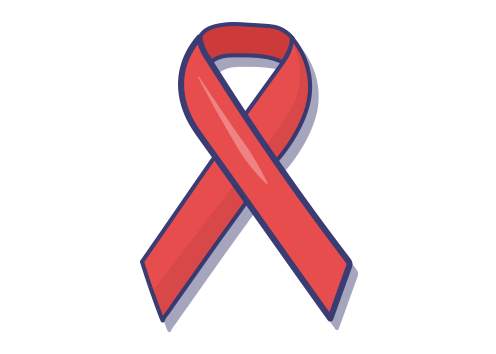What is HIV?
HIV stands for ‘Human Immunodeficiency Virus’. ‘Immunodeficiency’ refers to how this virus weakens a person’s immune system, the part of the body that fights off diseases.
What is AIDS?
AIDS stands for ‘Acquired Immune Deficiency Syndrome’. It means a collection of illnesses (‘syndrome’) caused by a virus people pick up (‘acquire’) that weakens their immune system (‘immune deficiency’)
You cannot get an AIDS diagnosis unless you are already HIV positive.
In the 1980s and early 1990s HIV treatment wasn’t good at fighting the virus and most people with it were eventually diagnosed with AIDS. Now, anti-HIV drugs can control (but not completely get rid of) the virus and far fewer people in Britain develop serious HIV-related illnesses.
Some people use the terms ‘HIV’ and ‘AIDS’ as if they mean the same thing but they don’t: HIV is a virus and people with it have ‘HIV infection’. Most of them don’t have AIDS. AIDS is a name to describe a set of illnesses people with HIV eventually get if they don’t receive treatment.

How is HIV passed on?
If someone living with HIV is taking HIV medication and has what is called an ‘undetectable viral load’ – they cannot pass on HIV.
If someone with HIV is not on treatment and they are infectious, they can pass on HIV through the following body fluids:
- blood
- semen
- vaginal fluid
- anal mucus
- breast milk.
For an infection to take place, one of these fluids has to get inside the body, and this happens most commonly during sex when a form of protection is not being used.
This can be prevented by using a condom during sex, or by the HIV negative person taking Pre-exposure prophylaxis (PrEP) or Post-exposure prophylaxis (PEPSE)
People who inject drugs can avoid HIV being passed on by not sharing drug injecting equipment.
For people living with HIV who want to have children, modern medicine is nearly able to eliminate the chance of parents passing HIV on to their baby. Your doctor or nurse can advise you on this in more detail.
How do I test for HIV?
People can live with HIV for years before having any symptoms. The only way to be sure is to have an HIV test . If you are living with HIV, the sooner you are diagnosed, the sooner you can start treatment which will keep you well and will stop you passing on the virus.
There are now many quick and convenient ways to test, including:
- A blood test
- A fingerpick test, with rapid results
- A postal test (where you send off the sample to get results)
Signs of HIV infection can’t be detected in the blood immediately. It usually happens within 45 days (6 weeks and 3 days) of infection but sometimes it may be a longer time period. Different tests can also take different lengths of time before they can detect a recent infection. If your risk was in the last three months, tell the person testing you as it may affect the type of test they use.
Unity staff can help you find the right test that works for you.

How effective is HIV Treatment?
If someone is on successful HIV treatment, they can have something called an ‘undetectable viral load’. This doesn’t mean the HIV is not there, just that the amount of the virus in the blood is too low for tests to pick up. An undetectable viral load also means someone with HIV cannot pass the virus on.
Viral load can increase again if the person with HIV stops taking their treatment.
The British HIV Association (BHIVA) now recommends that everyone diagnosed with HIV starts treatment straight away. This is because starting earlier is proven to keep people with HIV healthier.
Unity offers full support in the result of a negative or positive HIV diagnosis, with referral into specialist HIV clinical services of your choice.

